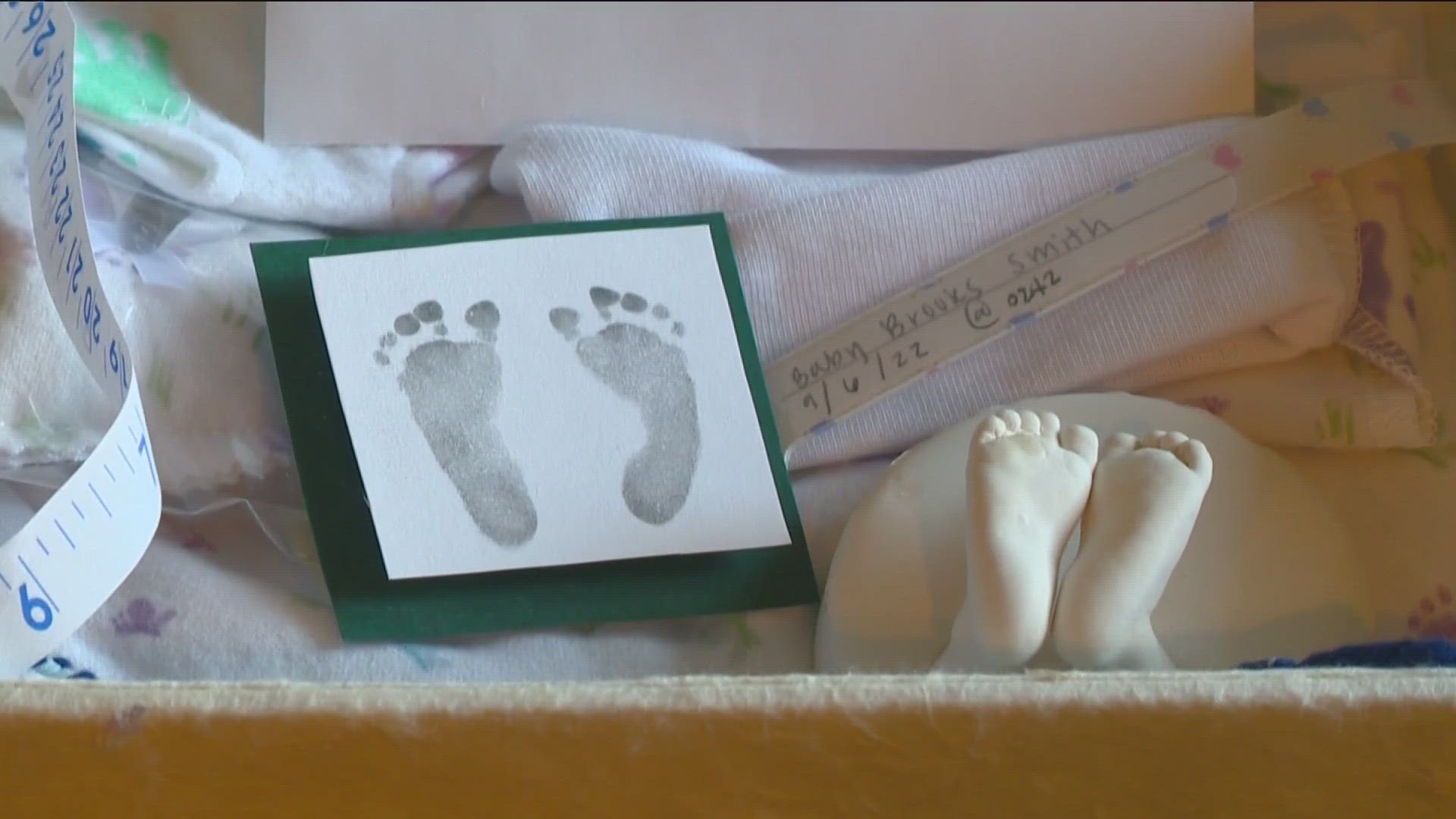BOISE, Idaho — While most pregnant women return home from the hospital with a newborn baby, Kayla Smith and her husband, James, returned home with a white memory box, a painful reminder of what could have been.
"We obviously would rather have our baby than this box," Kayla said, "and it's really sad to leave the hospital without your baby."
The couple found out they were pregnant on Mother's Day last year, automatically growing their family to four. Their daughter, Addison, is 2.5 years old. Kayla said everything was going well up until her 20-week anatomy scan.
James said the ultrasound sonographer kept going over the baby's heart, and in their own hearts, they knew something was wrong. The baby, who the couple named Brooks, had several fetal anomalies, including serious heart defects.
The couple met with a maternal-fetal medicine doctor and pediatric cardiologists. Unfortunately, all of the prognoses were the same. Kayla said Brooks had Critical Aortic Stenosis (CAS) and Hypoplastic left heart syndrome (HLHS).
"Based on what they were saying, it wasn't going to be operable," James said. "So, when we're told it's not operable, no choice is easy going forward."
Kayla and James were also worried about preeclampsia, which Kayla developed with Addison. Preeclampsia is a pregnancy complication that can cause high blood pressure and other dangerous complications.
The couple said they were faced with a "crap buffet of choices."
"We didn't want our son to suffer, and also, I felt like there I was putting myself at risk [since] getting preeclampsia was very likely towards the end of my pregnancy," Kayla said.
At 21 weeks, the couple traveled to Washington state to get an early induction of labor. Under Idaho's abortion laws, Kayla could not get that care in state. As of last year, abortions are only legal in cases of rape or incest with a police report or if the pregnant person will die.
Kayla isn't the only woman dealing with an impossible situation. Dr. Stacy Seyb, a maternal-fetal medicine specialist, said doctors around Idaho are referring people out of state.
He said the lack of reproductive options in Idaho hit low-income families the hardest.
"Not everybody has the money to pick up and go to another state, spend a few days, maybe even pay cash or money … some places want it upfront," Seyb said.
Seyb doesn't agree with Idaho's strict abortion laws and said doctors always have the mother's and baby's best interest in mind. He believes, in some cases, it's "cruel" to carry a baby full-term and that strict abortion laws take parental rights away.
"I think the medical profession is very conscientious about saving lives and taking care of babies and moms," he said. "If a pregnancy is ended, it usually means that there's a situation that either mom's life is at risk or the actual outcome of the pregnancy was going to be lethal or a very, very, extremely poor outcome."
Not everyone agrees, including Blaine Conzatti, Idaho Family Policy Center president. Conzatti, who helped write Idaho's heartbeat law, said Idaho's abortion laws protect all babies, born and unborn.
Conzatti said every preborn child has the "right to life" and believes all babies deserve to be carried full-term, regardless of their health.
"Abortion laws that would allow for an abortion to take place in cases of fetal abnormalities don't respect the humanity and the dignity of the preborn child, that preborn child shouldn't be killed because of their disability," Conzatti said.
Conzatti also said Idaho's abortion laws don't go far enough and hopes lawmakers remove the exceptions for rape and incest.
But Seyb said health care isn't black and white, especially maternal health care. Abortions aren't done for convenience, and Seyb said he has never seen a woman, no matter the situation, not be greatly affected by the decision she makes.
"There are so many factors that go into a family's life, a woman's life, that they can't account for in legislation," he said.
Seyb also said current legislation around abortions is confusing and makes doctors fearful of potential repercussions. Currently, Republican lawmakers are working to clarify what is and isn't considered an abortion.
That bill is currently sitting on Gov. Little's desk.
Conzatti said there are more than 20 pro-life pregnancy resource centers throughout Idaho, including Stanton Healthcare. He said those centers help families facing unplanned or unexpected pregnancies with financial support, practical assistance and medical care.
In a statement sent to KTVB, Stanton's director of clinical services said "perinatal hospice can provide families and their babies with the support and resources to honor the baby's life, however short that may be. Stanton will continue to advocate for and provide hope and support-filled solutions for the women, children and families of Idaho."
Inducing Brooks early and ending her pregnancy wasn't a decision Kayla ever thought she would have to make. In her eyes, she didn't see any other option.
Kayla and James said the grief ebbs and flows. By sharing her story, Kayla hopes some people in Idaho reconsider their stance on abortion and keep an open mind about how these laws are affecting women.
"It's not about killing babies, and I hate saying that," she said. "It's about women's rights and women's ability to choose for their bodies and bodily autonomy. In our situation, I wanted to bring home my son. But I didn't get to do that."
Watch more Local News:
See the latest news from around the Treasure Valley and the Gem State in our YouTube playlist:

